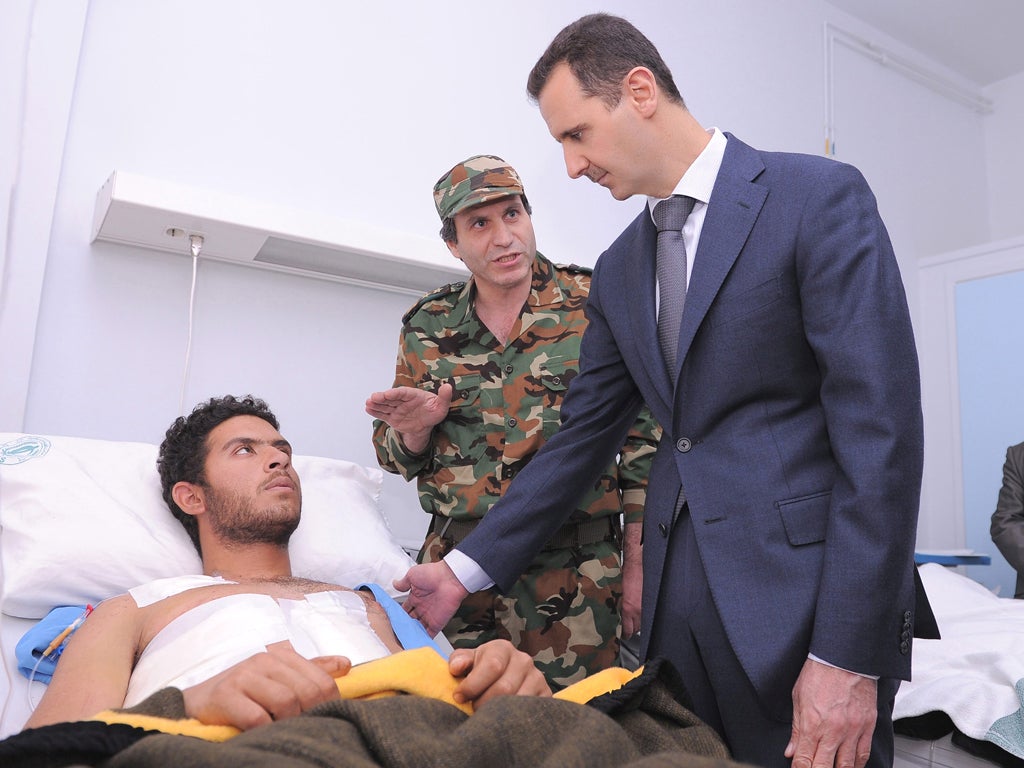Syria's wounded lay blame on Mossad or MI6 – but never Assad

Your support helps us to tell the story
From reproductive rights to climate change to Big Tech, The Independent is on the ground when the story is developing. Whether it's investigating the financials of Elon Musk's pro-Trump PAC or producing our latest documentary, 'The A Word', which shines a light on the American women fighting for reproductive rights, we know how important it is to parse out the facts from the messaging.
At such a critical moment in US history, we need reporters on the ground. Your donation allows us to keep sending journalists to speak to both sides of the story.
The Independent is trusted by Americans across the entire political spectrum. And unlike many other quality news outlets, we choose not to lock Americans out of our reporting and analysis with paywalls. We believe quality journalism should be available to everyone, paid for by those who can afford it.
Your support makes all the difference.The Syrian soldiers lying wounded in their hospital beds at the Tishreen military hospital on the outskirts of Damascus know exactly who to blame for their often horrific injuries: Israel, Saudi Arabia, the United States, MI6, Afghanistan, Jihadis. Anyone, it seems, except their own government.
The word that passes almost everyone's lips when asked who they think shot them or why they took up arms is "conspiracy". Like the state television reports beamed into Syrian homes, the soldiers tell of fighters from Pakistan, Iraq and Afghanistan trying to foment an Islamist uprising, or agents from other Arab or Western states – or indeed the old foe Israel – bent on sowing chaos in Syria. "Most of these jihadis are linked to the British intelligence and the CIA and Mossad," says Ghassan, a 48-year-old colonel, who refuses to give his second name. "The rest is media fabrication." Pressed on the exact identity of his attackers, he says: "There are some Syrians, but they are criminals, drugs men."
Ghassan was shot in the chest in the eastern suburbs of Damascus. He unzips his blue tracksuit top, slowly as he grimaces with pain, to show a tapestry of stitches. Then he pulls up his trouser leg and proudly displays two other bullet wounds sustained earlier in the conflict. He says he has killed opposition members, too, but adds: "I have not shot anyone unless I was shot at."
At no point will these men concede that their government is even remotely at fault. This is not the case throughout the country. Opposition groups say many soldiers have put down their weapons and defected, appalled at abuses they were asked to commit against the Syrian people. They now form the basis of the Free Syrian Army – the regime's "terrorists".
But so far no senior military figures or principal units have switched allegiances. Their ranks are stuffed with members of the same minority Alawite community as the ruling family and they remain fiercely loyal to President Bashar al-Assad. The young men at Tishreen appear utterly indoctrinated.
And despite the far-fetched nature of some of the claims, there are signs they could be partly right. A leader of al-Qa'ida, Ayman al-Zawahri, on Saturday called on Muslims from other countries to go to Syria to help overthrow the President. Iraqi officials have also said that fighters are travelling from the north into Syria.
For most of the opposition, this is disastrous news: they are desperate for their "revolution" to be secular and fear Mr Zawahri's statement plays directly into Mr Assad's narrative of a brave Syria fending off foreign invaders.
They also do not consider his foot soldiers the enemy. Their vitriol is reserved for the Assad family and their powerful backers, who they say are ready to use all the firepower at their fingertips.
"There is an equation that has not been stated in a clear way. If you are not with us, we are ready to destroy this country over our heads – it's either me, or chaos," says one middle-aged professional who refuses to give his name. "They want to destroy the country and they have the means to do so."
There is no doubt that regime soldiers – from the young conscripts to seasoned officers – are suffering a heavy toll from the unrest.
Although the armed opposition is outgunned by the Syrian military, attacks against security checkpoints and military stations have increased and anyone there appears to be considered a legitimate target.
A man who looks so much younger than his 20 years lies in bed covered by a sheet. The nurse says he was shot in the back on the outskirts of Homs on 1 February while manning a security checkpoint. "He is just one soldier, what is his sin?" asks his father, Assad Asini, as he holds vigil by his only son's bedside. "Now he will not walk again for the rest of his life."
In a nearby room, a 23-year-old man lies still on the bed, his head twisted to one side as he stares blankly at the door. He was shot in the neck, his friends say, and is now a quadriplegic. The nurse urges him to say something. He tries, but cannot form the words.
Next door is another soldier, the nurses whisper conspiratorially, shot by what they say is an Israeli-made bullet with an unknown poison that renders people unable to walk. Rumours and far-fetched conspiracy theories are in abundance at the military hospital. But so is a genuine sense of suffering, grief and fear for Syria's future.
Join our commenting forum
Join thought-provoking conversations, follow other Independent readers and see their replies
Comments